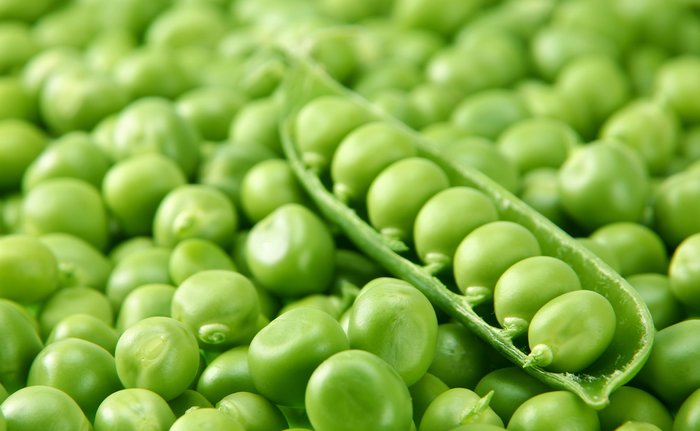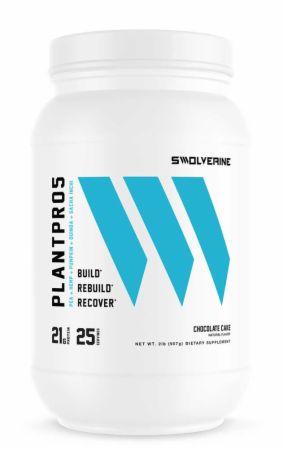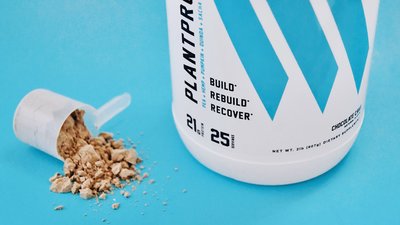The biggest challenge when looking for a great source of plant-based protein is knowing which ones contain a full amino-acid profile to help deliver the protein you need on a plant-based diet. Compared to animal protein, plant protein sources are unique, with each containing different essential nutrients.
The first step is to find a supplement with a label that reveals exactly how much of each ingredient is in the product. Some plant-based protein powders lump any number of ingredients into what's called a "proprietary blend." Unfortunately, without knowing the exact amount of each ingredient, you won't really know exactly how much of each you're ingesting.
With that caveat in mind, here are the five best protein sources to look for in a high-quality plant-based protein to get the nutrients you need to power your active lifestyle.
1. Pea Protein
Pea protein is perhaps the best plant protein source. Supplementing with a plant protein that has a full essential amino acid (EAA) profile is critical to initiating the muscle-building process known as muscle protein synthesis. Compared to other plant-based protein sources, pea protein has the highest essential amino acid mix, nearly rivaling whey protein in that regard.[1]
In a double-blind randomized controlled study published in the Journal of the International Society of Sports Nutrition, participants enrolled in a 12-week resistance-training program were given either pea protein, whey protein, or a placebo. The results showed a significantly greater effect on muscle composition in the pea protein group, with no clinical difference in strength between groups.[2]
A more recent study conducted at Lipscomb University in Tennessee that compared whey and pea protein supplementation, taken during eight weeks of high-intensity functional training, showed comparable benefits in strength, body composition, muscle thickness, and other factors.[3]

2. Hemp Protein
Hemp is another complete plant protein source, meaning it contains all nine essential amino acids. It also gets high marks for its fiber content, digestibility, and healthy fats, even though the oil is removed from the hemp seeds when they're processed.[4] Hemp's 3-1 ratio of omega-6 to omega-3 fatty acids may support heart, joint, and brain health. Additionally, hemp protein is rich in minerals and antioxidants, including phosphorus, magnesium, calcium, iron, manganese, zinc, and copper.

3. Pumpkin Seed Protein
Like hemp, pumpkin seeds contain nearly 60 percent protein and 30 percent fat, along with an abundance of essential vitamins and minerals such as potassium, magnesium, zinc, selenium, and copper.[5] In fact, pumpkin seeds are one of the best natural sources of magnesium on the planet. Maintaining healthy levels of this mineral may be particularly helpful for athletes who sweat more often.
Additionally, pumpkin seeds are rich in fiber, which supports digestive health. When looking for a high-quality plant protein powder, try to find one that includes pumpkin seed protein.

4. Sacha Inchi
Hailed as a new superfood, sacha inchi is a nut native to the Amazon jungle in South America. It contains all the essential amino acids, making it a complete protein source. It's also one of the most nutrient-dense nuts out there. Packed with alpha-linoleic acid, sacha inchi is another great source of healthy omega-3 fatty acids.[6]
A study published in the Journal of Agricultural Food Chemistry found that sacha inchi has a surprisingly high content of tryptophan, which, along with serotonin, is involved in regulating appetite.[7] Serotonin also helps control mood, promotes better quality sleep, and improves overall vitality.*
5. Quinoa Protein
Quinoa is also a very high-quality plant-based protein source. With a full essential amino acid profile, quinoa may help improve athletic performance measurements, such as increasing strength and muscle mass and optimizing body composition. The leucine content of quinoa equals 7.2 percent of its total protein. Leucine is intimately involved in muscle protein synthesis.*
*These statements have not been evaluated by the Food and Drug Administration. This product is not intended to diagnose, treat, cure, or prevent any disease.
References
- Gorissen, Stefan H. M., et al. (2018). Protein content and amino acid composition of commercially available plant-based protein isolates. Amino Acids, 50, 1685-1695.
- Babault, Nicolas, et al. (2015). Pea proteins oral supplementation promotes muscle thickness gains during resistance training: a double-blind, randomized, placebo-controlled clinical trial vs. whey protein. Journal of the International Society of Sports Nutrition, 12(1), 3.
- Banaszek, Amy. et al. (2019). The effects of whey vs. pea protein on physical adaptations following 8-weeks of high-intensity functional training (HIFT): a pilot study. Sports (Basel, Switzerland), 7(1), 12.
- House, J. D., Neufeld, J., & Leson, G. (2010). Evaluating the quality of protein from hemp seed (Cannabis sativa L.) products through the use of the protein digestibility-corrected amino acid score method. Journal of Agricultural and Food Chemistry, 58(22), 11801-7.
- Glew, R. H., Glew, R. S., Chuang, L. T., et al. (2006). Amino acid, mineral and fatty acid content of pumpkin seeds (Cucurbita spp) and Cyperus esculentus nuts in the Republic of Niger. Plant Foods for Human Nutrition, 61(2), 51-6.
- Gonzales, Gustavo F., et al. (2018). Nitrogen balance after a single oral consumption of sacha inchi (Plukenetia volúbilis L.) protein compared to soy protein: a randomized study in humans. Toxicology Mechanisms and Methods, 28(2), 140-147.
- Sathe, S. K., Hamaker, B .R., Sze-tao, K. W., & Venkatachalam, M. (2002). Isolation, purification, and biochemical characterization of a novel water-soluble protein from Inca peanut (Plukenetia Volubilis L.). Journal of Agricultural and Food Chemistry, 50(17), 4906-8.

.png)
